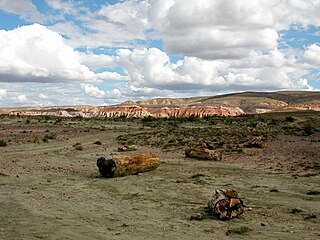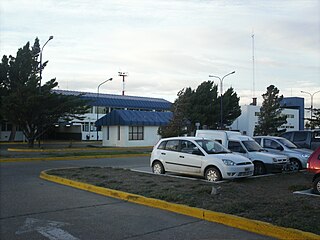
Chubut is a province in southern Argentina, situated between the 42nd parallel south, the 46th parallel south, the Andes range to the west, and the Atlantic ocean to the east. The province's name derives from the Tehuelche word chupat, meaning "transparent," their description of the Chubut River.

Bahía Blanca is a city by the Atlantic Ocean, in the southwest of the province of Buenos Aires, Argentina. It is the seat of government of the Bahía Blanca Partido. It had 301,572 inhabitants according to the 2010 census [INDEC]. It is the principal city in the Greater Bahía Blanca area.

Comodoro Rivadavia is a city in the Patagonian province of Chubut in southern Argentina, located on the San Jorge Gulf, an inlet of the Atlantic Ocean, at the foot of the Chenque Hill. Comodoro Rivadavia is the most important city of the San Jorge Basin, and is the largest city in Chubut as well as the largest city south of the southern 45th parallel.

The following is an alphabetical list of topics related to the Argentina.
Notohypsilophodon is a genus of ornithopod dinosaur from the Late Cretaceous of Argentina. It was described as the only "hypsilophodont" known from South America, although this assessment is not universally supported, and Gasparinisaura is now believed to have been a basal euornithopod as well.

Sarmiento is a town in the province of Chubut, Argentina. It has about 8,000 inhabitants as per the 2001 census [INDEC], and is the head town of the department of the same name. It is located on the so-called Central Corridor of Patagonia, in a fertile valley amidst an otherwise arid region, 140 km west from Comodoro Rivadavia, in the south of Chubut. It sits between two lakes, Lake Musters and Lake Colhue Huapi. Notable attractions are the Petrified Forest and caves with Aborigine hand paintings.

The National University of San Juan is a public university in Argentina. Its seat is located in the city of San Juan, capital of the province of the same name, in the Cuyo region. It was founded in 1973, based on several local institutions and a faculty of the National University of Cuyo.

The Roman Catholic Diocese of Comodoro is located in the city of Comodoro, in the Patagonian province of Chubut in southern Argentina.
Enrique G. Herrscher is an Argentine economist, systems scientist and professor at the University of Buenos Aires.
The General Mosconi neighbourhood is located three kilometres away from the downtown of Comodoro Rivadavia to the north, in Chubut, Argentina.

General Enrique Mosconi International Airport is an international airport in the Chubut Province, Argentina serving Comodoro Rivadavia. The airfield is located 8 kilometres (5 mi) north of the city, covers an area of 810 hectares, and has a 4,000 square metres (43,000 sq ft) terminal.

The National University of Comahue is an Argentine national university with branches in the provinces of Neuquén, Río Negro and Chubut, with a centre in the city of Neuquén and units in Viedma, Bariloche, San Martín de los Andes, Cipolletti, Zapala, Allen, General Roca, Choele Choel, San Antonio Este, Villa Regina, Esquel, Puerto Madryn and Trelew. It is the largest public university in Argentine Patagonia.

The National University of Austral Patagonia is an Argentine national university in Santa Cruz Province. The university is divided into four campuses, located in the cities of Caleta Olivia (UACO), Río Gallegos (UARG), San Julián (UASJ) and Río Turbio (UART), and was founded in 1995, by national law 24.446.

The National University of Misiones is a public university in Argentina. It has a publishing house and a radio station, LRH301 FM Universidad Nacional de Misiones, that streams in Ogg Vorbis format.

The National University of Tierra del Fuego, Antarctica and South Atlantic Islands is an Argentine national university in Tierra del Fuego Province. The campus university is located in the city of Ushuaia. The institution was founded through National Law 26.559, enacted by Congress on November 14, 2009, and was formally established on December 28, 2010.

Martín Buzzi is an Argentine political scientist and politician elected Governor of Chubut Province in 2011.
Fabián E. Bustamante is an Argentinian-American computer scientist specializing in distributed systems and computer networking. He is currently a professor of computer science at Northwestern University.

Comodoro Rivadavia Cathedral is the cathedral church of Comodoro Rivadavia, Chubut Province, Argentina. It is situated at the intersection of Avenida Belgrano and Rivadavia. The cathedral is the city's main Roman Catholic church, serving the Diocese of Comodoro Rivadavia, part of the Archdiocese of Bahía Blanca. It was inaugurated by Bishop Moure Argimiro on November 26, 1978, and consecrated on June 9, 1979, by Monsignor Mariano Pérez, first Bishop of Comodoro Rivadavia. The building was constructed in Gothic-Modern style; some elements, such as a stained glass window, were brought from Turin, Italy, in 1959.

Bolivian Argentines are Argentine citizens of Bolivian descent or Bolivia-born people who immigrated to Argentina. In recent decades, Bolivia has become one of the main sources of immigration in Argentina, making Bolivians one of the largest Hispanic American immigrant groups in Argentina, along with Paraguayans, Peruvians and Venezuelans.















